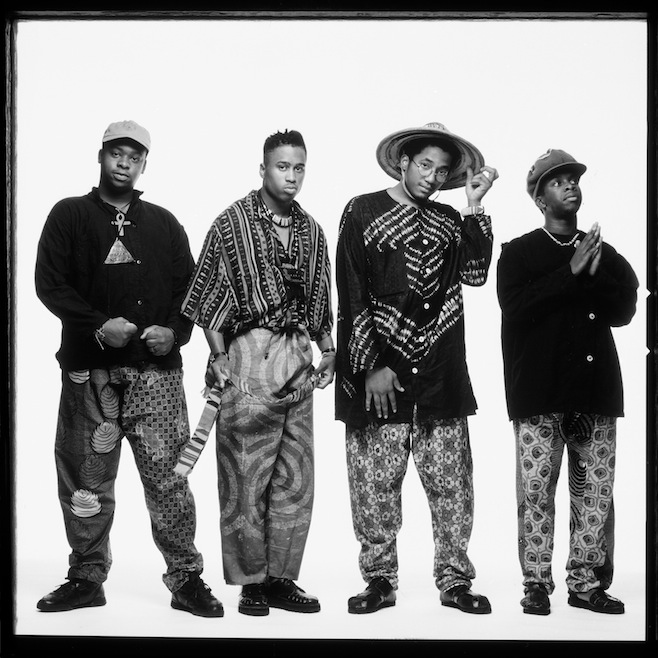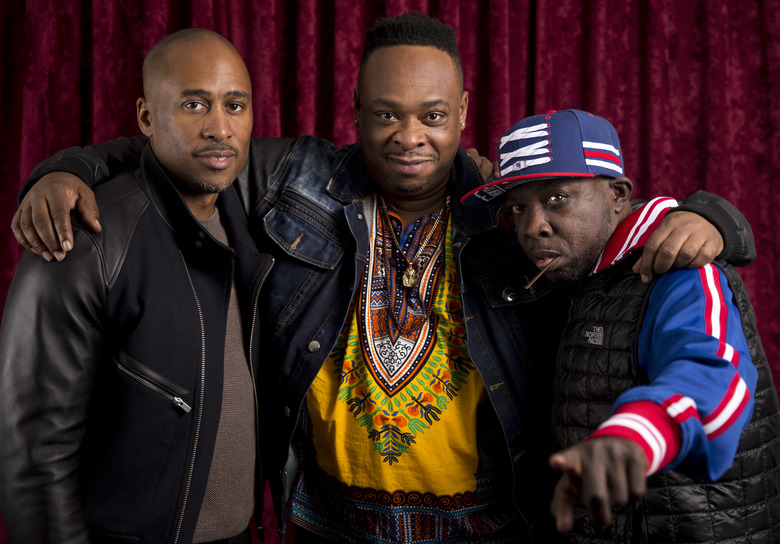 (Photo Credit: Pitchfork)
(Photo Credit: Pitchfork)
It’s not about standing still and becoming safe. If anybody wants to keep
creating they have to be about change.
- Miles Davis
It would be foolhardy to begin this article without at least
acknowledging the tragedy - travesty in the eyes of some -
that was the recent Presidential election. In sore times, in
tough times it becomes even more apparent that folks will
need to go to the well of community and love and creativity.
Every period of hardship, has been followed by artistic creations
that have not only depicted the mood of the times, but have
allowed those going through it to endure and ascend, and
speak to other generations as well.
In this case, the problem and the solution share the most
unlikely of birthplaces - Queens, New York. And it is the
solution, the farewell album from one of hip-hop’s most
iconic groups by the name of A Tribe Called Quest, that
has brought some much needed light back into the epicenter
of the current state of the times.
There’s no subtle irony in the release of We Got It From
Here…Thank You 4 Your Service. When the news broke
a week ago that ATCQ was going to release a final album,
with ALL the original members, it spread like wildfire. To
do it on Veteran’s Day was even more poignant given what
the group from Linden Boulevard gave to the culture and
that one member is longer here to bear earthly witness
to how this album is being received. Phife Dawg passed on
this March, and this album is also a tome of gratitude to
his presence as the heart and soul of A Tribe Called Quest.
In listening throughout, Phife’s voice and spirit is highly
evident. It stokes a great deal of emotion at times on
certain tracks, especially the last one. To some degree, it
is like the effect David Bowie’s Blackstar had after his own
passing that began the topsy-turvy year that is 2016.
The album opens with “The Space Program” and immediately
puts you in the midst of what I’ve come to realize is a safe
zone for the soul. To hear the opening refrain - “we gotta
get it together for brothers…we gotta get it together for
sisters…” you are immediately reminded of how much Tribe
owes to the armada of music that came before them and
how much it shaped their own sound. We saw ample evidence
of that in their Beats Rhymes and Life documentary and it
is used to the maximum extent here. “The Space Program”
lets you know you’re here to get lost in the rhythm, but you
will also hear some real deal truths. To hear Jarobi - Jarobi -
back on the mic in this fashion is another eye-opener just
off of these bars:
“space vessels off to Mars/population is overflowin’
what you think they want us there?/all us n****s
not goin’!!”
From there, the sequencing of tracks becomes more valuable
as Q-Tip flows over a synth-laden harmony of discordance that
has tinges of Loose Ends and Human League with bars that
speak directly to the angry and divisive rhetoric of Donald
Trump’s presidential campaign. But Phife’s joining in provides
clarity and swagger to make the track have a positive underbelly
despite the ominous chorus. “Solid Wall Of Sound” is a welcome
melange of styles thanks to Tip’s production work with Jack
White, and Busta Rhymes steps in with his signature bravado
to tie everything together more neatly than one would think.
And that is another powerful factor behind We Got It From Here…
the amount of collaborative effort that both defines the beauty
of rap music and hip-hop culture as both truly American and
ultimately, global. German electronica, Jamaican reggae, Trini
soca, psychedelic and alternative rock music, even a touch of
grime from the U.K. bubble throughout like a fine and hearty
serving of chicken and dumplings soup you’d get from the
gleaming silver cookpot at your local pattie shop. Look at the
artists who took part on this album. Andre 3000, Elton John,
Jack White, Marsha Ambrosius, Kendrick Lamar, Talib Kweli,
even Kanye West. (Side note - I do think that on a sonic level,
We Got It From Here is successful because of what ‘Ye’s Yeezus
put forth but never quite hit the mark on consistenly in terms
of overall production capturing a bridging of punk & rock influence.)
 (Photo Credit: Seattle Times)
(Photo Credit: Seattle Times)
We Got It From Here also serves as keen observation on the way
that rap has evolved. Take “Kids” for example. Andre Three Stacks
starts out with his deep and laconic style in a track that on the
surface seems to be an “old head” throwing shots at the current
generation of rap fans that dig the contemporary artists who some
view as having little to no substance. His wordplay with Q-Tip’s bars
depicting a young cat’s wanting to be grown and equating that to
material possessions makes this a track of understanding and
reconciliation once the two go back and forth to bring the lesson to
light - you have to have perspective. Andre 3000’s words here are
sharp as ever with some shades of the “Class of 3000” days. This
is real when you considered that ATCQ essentially disbanded in the
midst of the reign of Southern rap and the “bling” era. Another
generational and genre merge point is to be found on “Conrad Tokyo”,
with Phife joining forces with Compton’s own Kendrick Lamar to craft
a groovy and piercing track that could fit in 1995 as well as it does now.
Hell, one could even see this being done live with Bad Brains as a
backing group. Then there’s “Moving Backwards”, a highly introspective
duet piece with Q-Tip and Anderson .Paak. That track is lush, and
gives you some of the same feeling found on ATCQ’s The Low End
Theory. And then…”The Donald”. I had to listen to it a few times,
and felt a bit wistful. It is a fitting way to close out the album, with
Phife being the lead MC over a backdrop of Busta Rhymes providing a
‘90’s dancehall chorus to fit the cadence of production crafted by Q-Tip
and Jack White. At times during the album, you can hear Phife’s voice
slightly different but here - here is where the studio becomes a
DeLorean-styled time machine. Also, I tend to believe that the name
of the track is more of a defiant middle finger to the reality-show magnate,
the signature “to hell with you”. Bear in mind, ATCQ rose to fame in
a city that was dealing with racial strife due in part to opposition by
some to the first Black mayor, David Dinkins as well as incidents like
the Central Park Five which Trump inserted himself into viciously and
without pause in true arrogance.
In all honesty, what this farewell album does is the same as what
has been brought forth by albums like Kendrick Lamar’s To Pimp A
Butterfly. D’Angelo’s Black Messiah. Solange Knowles’ A Seat At The
Table and many others. It is now part of the wellspring of healing and
revolutionary music that Black and Brown people - all people in the
long run - can count as their own in these uncertain times. It’s right
on time and OF the time. That distinction can’t be overlooked. We Got
It From Here also provides the perfect bookend to what A Tribe Called
Quest truly was. Think about the pop-up shop they’re putting on
this weekend. It’s located in Chinatown, a short ways from the site
of one of NYC’s most beloved concert venues, The Wetlands. Which is
now like many other cherished spots a victim of the onslaught of
gentrification. Their appearance this evening on Saturday Night Live
with the great Dave Chappelle is also a reflection of a New York City
that many miss and only the stick-in-the-muds downrate. With this
album, A Tribe Called Quest cements their importance as one of the
greatest rap groups of all time, but as one of the greatest influences
on music. Period. And in true fashion, they’ve given us the gift once
again of finding and keeping to the instinctive paths of rhythm we
have had obscured in these dark times.